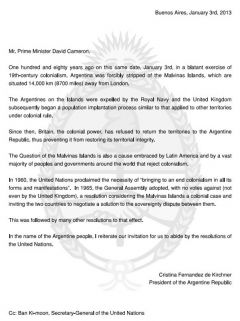Cristina Fernandez asks Cameron to return the Falklands “forcibly stripped” in 1833
Thursday, January 3rd 2013 - 00:31 UTC
Prime Minister David Cameron must return the Falkland Islands to Argentina, 180 years after the territories were “forcibly stripped” from Buenos Aires, President Cristina Fernandez has claimed in UK newspaper adverts scheduled to be published on Thursday and which has been anticipated.
Prime Minister David Cameron must return the Falkland Islands to Argentina, 180 years after the territories were “forcibly stripped” from Buenos Aires, President Cristina Fernandez has claimed in UK newspaper adverts scheduled to be published on Thursday and which has been anticipated.
-
In an emotional open letter to the British PM, Cristina Fernandez has called on him to honor a United Nations resolution dating from 1965 and start negotiations about handing over the islands.
The letter, which was due to be published in the British national newspaper “The Guardian” on Thursday, is timed to mark the anniversary of when on 3 January 1833 Britain took control of the Falklands from Argentina.
A copy of the 212-word letter was advanced to UN Secretary General Ban Ki-moon.
It says: “One hundred and eighty years ago on this same date, January 3rd, in a blatant exercise of 19th century colonialism, Argentina was forcibly stripped of the Malvinas Islands, which are situated 14,000 km away from London.
“The Argentines on the Islands were expelled by the Royal Navy and the United Kingdom subsequently began a population implantation process similar to that applied to other territories under colonial rule.
“Since then, Britain, the colonial power, has refused to return the territories to the Argentine Republic, thus preventing it from restoring its territorial integrity.
“The question of the Malvinas is also a cause embraced by Latin America and by vast majority of peoples and governments around the world that reject colonialism.
“In 1960, the United Nations proclaimed the necessity of ‘bringing to an end colonialism in all its forms and manifestations’.
“In 1965, the General Assembly adopted, with no votes against (not even by the United Kingdom), a resolution considered the Malvinas Islands a colonial case and inviting the two countries to negotiate a solution to the sovereignty dispute between them.
“This was followed by many other resolutions to that effect. In the name of the Argentine people, I reiterate our invitation for us to abide by the resolutions of the United Nations.”
The Falklands’ population is overwhelmingly pro-British and is scheduled to hold a referendum with international observers next March on the Islands political status. PM Cameron has said the UK would “respect and defend” the result of the plebiscite.
Dr Barry Elsby, Member of the Legislative Assembly of the Falkland Islands, told “The Daily Telegraph” on Wednesday night: “We are not a colony – our relationship with the United Kingdom is by choice.
”Unlike the Government of Argentina, the United Kingdom respects the right of our people to determine our own affairs, a right that is enshrined in the UN Charter and which is which is ignored by Argentina.”
On Wednesday night the Foreign Office said that it “strenuously denied” that Britain expelled Argentine citizens from the Falklands in 1833.
A spokesman said: “The people of the Falklands are British and have chosen to be so. They remain free to choose their own futures, both politically and economically, and have a right to self-determination as enshrined in the UN Charter.
“This is a fundamental human right for all peoples. There are three parties to this debate, not just two as Argentina likes to pretend. The Islanders can’t just be written out of history.
“As such, there can be no negotiations on the sovereignty of the Falkland Islands unless and until such time as the Islanders so wish.”
The diplomatic broadside follows the British government's decision last month to name a large frozen chunk of Antarctica after the Queen – a gesture viewed in Buenos Aires as provocative.
In an emotional open letter to the British PM, Cristina Fernandez has called on him to honor a United Nations resolution dating from 1965 and start negotiations about handing over the islands.
The letter, which was due to be published in the British national newspaper “The Guardian” on Thursday, is timed to mark the anniversary of when on 3 January 1833 Britain took control of the Falklands from Argentina.
A copy of the 212-word letter was advanced to UN Secretary General Ban Ki-moon.
It says: “One hundred and eighty years ago on this same date, January 3rd, in a blatant exercise of 19th century colonialism, Argentina was forcibly stripped of the Malvinas Islands, which are situated 14,000 km away from London.
“The Argentines on the Islands were expelled by the Royal Navy and the United Kingdom subsequently began a population implantation process similar to that applied to other territories under colonial rule.
“Since then, Britain, the colonial power, has refused to return the territories to the Argentine Republic, thus preventing it from restoring its territorial integrity.
“The question of the Malvinas is also a cause embraced by Latin America and by vast majority of peoples and governments around the world that reject colonialism.
“In 1960, the United Nations proclaimed the necessity of ‘bringing to an end colonialism in all its forms and manifestations’.
“In 1965, the General Assembly adopted, with no votes against (not even by the United Kingdom), a resolution considered the Malvinas Islands a colonial case and inviting the two countries to negotiate a solution to the sovereignty dispute between them.
“This was followed by many other resolutions to that effect. In the name of the Argentine people, I reiterate our invitation for us to abide by the resolutions of the United Nations.”
The Falklands’ population is overwhelmingly pro-British and is scheduled to hold a referendum with international observers next March on the Islands political status. PM Cameron has said the UK would “respect and defend” the result of the plebiscite.
Dr Barry Elsby, Member of the Legislative Assembly of the Falkland Islands, told “The Daily Telegraph” on Wednesday night: “We are not a colony – our relationship with the United Kingdom is by choice.
”Unlike the Government of Argentina, the United Kingdom respects the right of our people to determine our own affairs, a right that is enshrined in the UN Charter and which is which is ignored by Argentina.”
On Wednesday night the Foreign Office said that it “strenuously denied” that Britain expelled Argentine citizens from the Falklands in 1833.
A spokesman said: “The people of the Falklands are British and have chosen to be so. They remain free to choose their own futures, both politically and economically, and have a right to self-determination as enshrined in the UN Charter.
“This is a fundamental human right for all peoples. There are three parties to this debate, not just two as Argentina likes to pretend. The Islanders can’t just be written out of history.
“As such, there can be no negotiations on the sovereignty of the Falkland Islands unless and until such time as the Islanders so wish.”
The diplomatic broadside follows the British government's decision last month to name a large frozen chunk of Antarctica after the Queen – a gesture viewed in Buenos Aires as provocative.



No comments:
Post a Comment